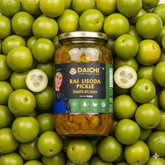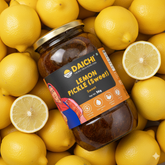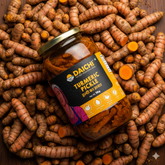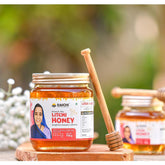Pickles are more than just a side dish in Indian homes, they’re a burst of nostalgia, flavor, and love packed inside a glass jar. The tang of mango, the heat of chili, the crunch of lime, every bite reminds us of home. But today, when supermarkets are filled with factory-made versions, it’s worth asking: are store-bought pickles really as good as the ones made at home?
The answer, quite simply, is no. Whether you make them yourself or choose to buy homemade pickles online, there’s a world of difference in taste, nutrition, and authenticity. Here’s why homemade pickles are the real deal.
Authentic Taste That Feels Like Home
Nothing can replicate the taste of a jar lovingly made in someone’s kitchen. Homemade pickles carry the authentic flavors of traditional recipes that have been passed down for generations. Each region in India has its own distinctive style, from Andhra’s fiery avakaya to Gujarat’s sweet mango pickle, and that uniqueness gets lost in mass-produced versions.
Store-bought pickles are often standardized to appeal to everyone, which means they taste the same everywhere, a far cry from the bold, distinct, and handcrafted flavors of home. When you open a jar of homemade pickle, you’re not just opening food; you’re opening memories.
Pure, Honest Ingredients
One of the biggest advantages of homemade pickles is ingredient purity. They’re made using natural, local, and seasonal ingredients, ripe fruits, cold-pressed oils, and hand-ground spices, without artificial colors, preservatives, or flavor enhancers.
That’s exactly what Daichi Pickles stand for: small-batch pickles made the traditional way, using sun-dried fruits, pure spices, and cold-pressed mustard or sesame oil. Each jar captures the taste of home; clean, wholesome, and free from hidden additives.
Healthier and Easier to Digest
Traditional pickling is a natural preservation process that enhances nutrition rather than destroying it. Fermented homemade pickles contain healthy probiotics that support digestion, gut health, and immunity.
Commercial pickles, on the other hand, are often pasteurized or chemically treated, killing the good bacteria that make pickles beneficial. That’s why Daichi’s naturally fermented pickles feel light on the stomach yet rich in taste, just like your nani’s.
Balanced Use of Oils and Spices
Homemakers know the value of balance, the right ratio of oil, salt, and spice ensures that every pickle matures perfectly over time. Homemade pickles are made in small batches where each jar is monitored and mixed by hand. This results in a pickle that’s flavorful but not overpowering, oily, or too salty.
In store-bought pickles, cost efficiency and mass production take precedence over quality. The result? Excess oil, synthetic flavoring, and inconsistent taste. Homemade versions retain that delicate harmony of tang, spice, and aroma, exactly the way they’re meant to be enjoyed.
The Power of Seasonal Ingredients
True pickling depends on timing. The best homemade pickles are made only when the fruit or vegetable is in its peak season, like raw mangoes in summer or gooseberries in winter. This ensures that the produce is fresh, nutrient-dense, and full of natural flavor.
Daichi’s pickles celebrate that seasonality with traditional varieties like Garlic, Lemon, Red Chilli, and Mango Pickle, each made fresh during harvest season using locally sourced produce. No cold-stored ingredients, no shortcuts, just pure, seasonal goodness.
No Compromise on Quality
Every jar of homemade pickle is made in small quantities, often by local makers or family businesses who treat their craft with pride. They select the best raw ingredients, sun-dry them naturally, and mix them with hand-roasted spices, ensuring that every batch tastes just like the ones our mothers used to make.
Unlike industrial setups, where speed and volume matter, these makers prioritize care and authenticity. The result is a pickle that’s vibrant, flavorful, and wholesome, not just another condiment.
A Touch of Emotion and Tradition
Homemade pickles are not just about flavor, they’re about heritage. Each jar tells a story of mothers and grandmothers spending afternoons under the sun, preparing masalas and spreading mangoes to dry on the terrace.
That connection, that human touch, can never come from a machine or a factory. Buying the best homemade pickles means supporting that tradition, preserving recipes that have been perfected over generations.
More Variety, More Character
Every household has its own signature recipe. Some prefer extra garlic, others add jaggery or methi. When you explore homemade pickles online, you’ll find regional specialties that you won’t see in supermarkets, like Gongura pickle from Andhra, Pachranga from Punjab, or Kerala’s lemon achar.
This diversity is what makes India’s pickle culture so special. By choosing homemade, you’re celebrating that variety rather than settling for one-note flavors.
Supporting Local Artisans and Small Businesses
When you buy homemade pickles online, you’re not supporting a faceless corporation; you’re helping local families, small entrepreneurs, and home chefs who pour genuine effort into their craft. Each purchase encourages sustainable practices, reduces food waste, and keeps traditional Indian pickling alive.
Better Value for Health and Taste
While commercial pickles may seem cheaper, their nutritional and taste quality don’t compare. A jar of homemade pickle may cost slightly more, but it offers superior quality, authentic taste, and peace of mind. You’re paying for purity, care, and the assurance that every bite is free from synthetic chemicals.
Conclusion
There’s something irreplaceable about homemade pickles, the aroma, the craftsmanship, the memories they carry. They’re not just condiments but pieces of family heritage, bottled with love and care.
So the next time you crave a tangy mango or spicy chili pickle, skip the supermarket aisle and explore Daichi Homemade Pickles online. Choose the best homemade pickles in India — small-batch, chemical-free, and bursting with real Indian flavor.
Because some things in life, like pickle recipes and love, are best kept homemade.









